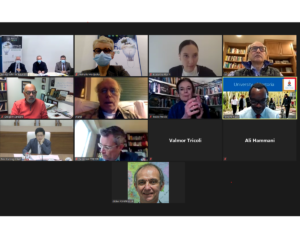Global thematic initiatives on the agenda at the second MIAB board meeting
Due to the Covid-19 pandemic, the 2nd meeting of the Montpellier International Advisory Board (MIAB ) was held by videoconference over 2 days, on December 10-11, to overcome the time differences between participants. Following on from its initial recommendations (to promote large-scale, high-impact global projects and infrastructures), MUSE proposed to extend certain key initiatives internationally, with the aim of creating "global thematic initiatives or alliances".
 The potential of these global thematic initiatives is already illustrated by the close bilateral collaboration between MUSE consortium members and each of the institutions that make up MIAB.[1]. MUSE's proposal is to enhance, intensify and broaden these links, placing them in a multilateral framework. To this end, MUSE proposes the creation of Key World Initiatives (Key WIs), whose aim is to facilitate the emergence of global research and teaching initiatives on specific themes.
The potential of these global thematic initiatives is already illustrated by the close bilateral collaboration between MUSE consortium members and each of the institutions that make up MIAB.[1]. MUSE's proposal is to enhance, intensify and broaden these links, placing them in a multilateral framework. To this end, MUSE proposes the creation of Key World Initiatives (Key WIs), whose aim is to facilitate the emergence of global research and teaching initiatives on specific themes.
Thus, at the2nd meeting of this council, MIAB members were able to attend the presentation by their respective holders of 3 MUSE Key WIs projects : Didier Fontenille for the VECT-OH Key WI (on Vector and Risk within a One-health perspective); Marie-Jo Amiot-Carlin for the FOODS Key WI; and Eric Servat for the WATERS Key WI. MIAB members were then asked for their views on how the process should be run, the relevance of the topics, and whether member institutions would be interested in taking part.
The three proposals, whose subjects were judged to be excellent, interconnected and relevant, were acclaimed by the assembly. Because of the critical mass and unique degree of international cooperation they each create in their field at a global level and over the long term, these initiatives have real potential and added value that sets them apart from other existing global initiatives on the same themes.
These Key World Initiatives could see the light of day as early as 2022, following a year of construction, the stages of which MUSE proposes to finance with the advice of MIAB members and, where appropriate, with their participation. For each of them, we've set a date for a remote working and exchange seminar in the first half of 2021, with implementation of the exchanges starting in the summer, on the occasion of the3rd MIAB meeting, which everyone hopes will be face-to-face.
[1] Created in March 2019, the MUSE International Strategic Advisory Board (MIAB) is made up of strategic partners, both French and foreign, academic and non-academic, relevant to the realization of MUSE's ambitions. Its role is to advise on structuring and strategic orientations for the development of the MUSE project in terms of education, research, innovation and international outreach.